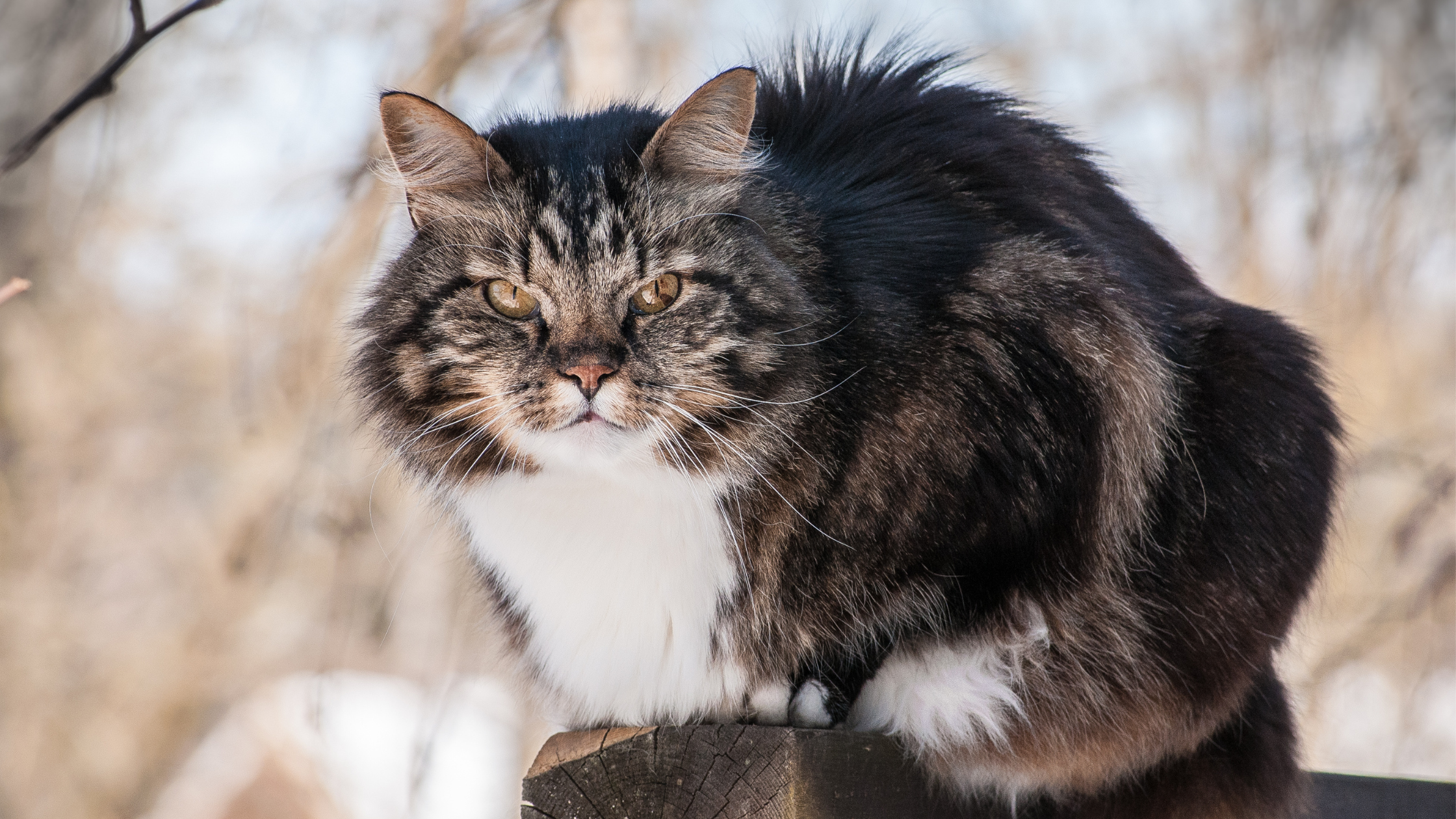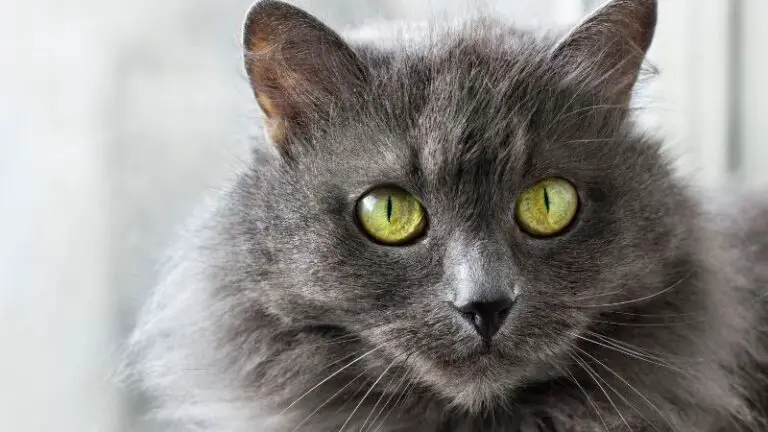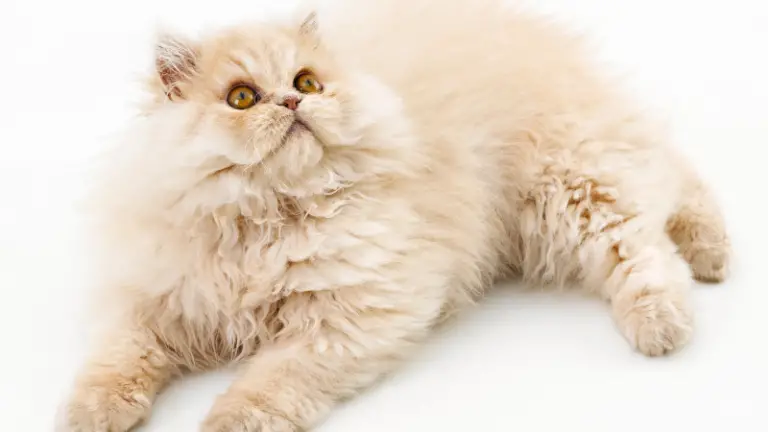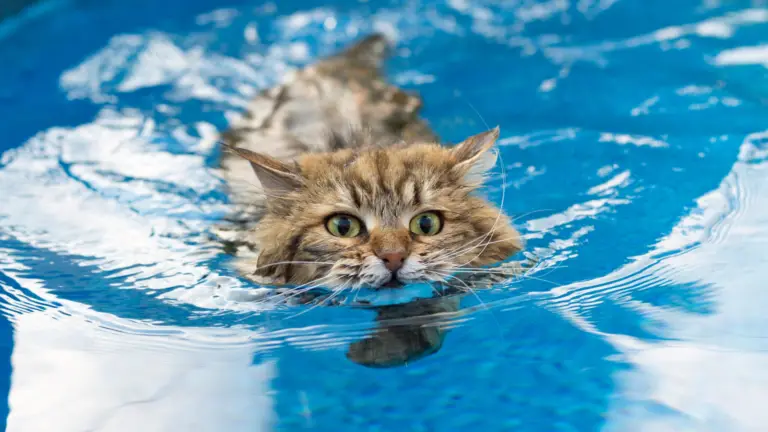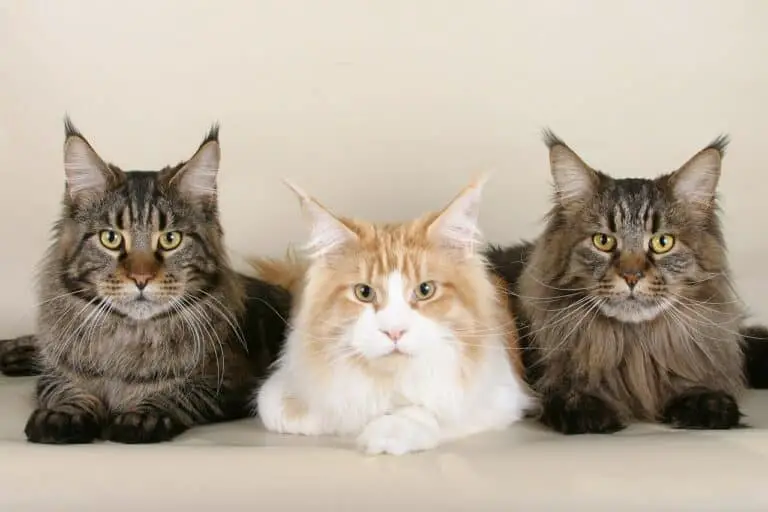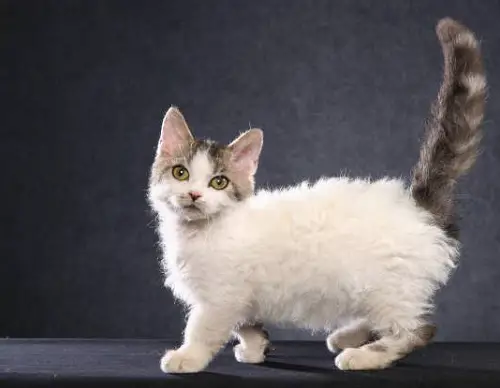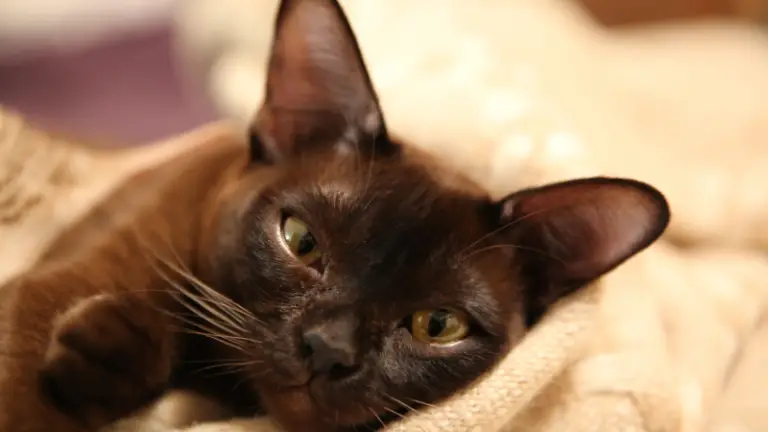ARE NORWEGIAN FOREST CATS HYPOALLERGENIC? [ ALL YOU NEED TO KNOW]
Are Norwegian forest cats hypoallergenic? Norwegian Forest Cats are not considered hypoallergenic. However, despite their long, thick coats, which can sometimes make them seem less likely to cause allergies, they still produce the allergenic protein Fel d 1 in their saliva and skin secretions, which can trigger allergic reactions in sensitive individuals.
But let’s get into the detail.
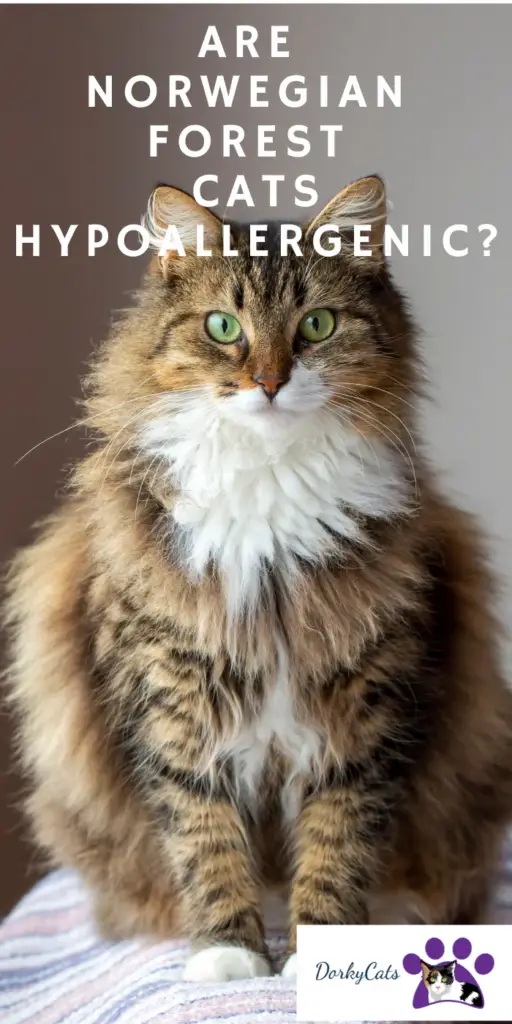
ARE NORWEGIAN FOREST CATS HYPOALLERGENIC?
Some people may have a milder reaction to Norwegian Forest Cats than other breeds, but they cannot be considered hypoallergenic.
Norwegian Forest Cats are not hypoallergenic because they produce the Fel d 1 protein, an allergen that can trigger an allergic reaction in some people. The Fel d 1 protein is found in the saliva and skin secretions of cats, including Norwegian Forest Cats, and can spread to their fur when they groom themselves.
When people come into contact with the allergen, either through petting a cat or inhaling particles from their fur or saliva, they can experience allergic symptoms such as sneezing, itchy eyes, and a runny nose.
Although Norwegian Forest Cats have long, thick coats that may help trap some of the allergens and reduce the amount released into the environment, they are still not considered hypoallergenic.
WHAT MEANS THAT A CAT IS HYPOALLERGENIC?
When a cat is hypoallergenic, it means they are less likely to cause an allergic reaction in people sensitive to cat allergens.
Some breeds of cats are considered hypoallergenic because they produce fewer allergens, have a different coat that sheds less or produces fewer allergens, or have another type of skin that produces less oil and dander.
However, it’s important to note that no cat breed is entirely hypoallergenic, as all cats produce some allergens. Additionally, some people may be more or less sensitive to specific breeds of cats, so one person may experience an allergic reaction to a cat that another person doesn’t.
DO NORWEGIAN FOREST CATS SHED A LOT?
Norwegian Forest Cats do shed but are not considered particularly heavy shedders.
Their long, thick, water-repellent coats require regular brushing to prevent matting and remove loose fur, especially during the spring shedding season when they shed their winter coats.
However, with regular grooming, shedding can be controlled and should not be a significant issue for most people. It is important to note that all cats shed to some extent, and individual cats may vary in their shedding patterns depending on factors such as age, health, and diet.
WHAT CAN NORWEGIAN FOREST CATS OWNER DO TO REDUCE CAT ALLERGIES REACTIONS?
If you or someone in your household is allergic to cats, but you still want to adopt a Norwegian Forest Cat, there are a few things you can do to reduce the risk of allergic reactions:
KEEP THE CAT OUT OF CERTAIN AREAS
Designate certain areas of the house as off-limits to your cat, such as the bedroom or a study area. This can help reduce exposure to allergens.
GET AN AIR PURIFIER
HEPA air purifiers can help to remove airborne allergens from the environment, including cat dander.
HEPA stands for High-Efficiency Particulate Air. A HEPA air purifier is an air cleaner that uses a HEPA filter to trap small particles in the air. HEPA filters are made from tightly woven glass fibers and are designed to capture particles as small as 0.3 microns, such as pollen, pet dander, dust mites, and other airborne allergens.
Ideas for Hepa air purifiers:

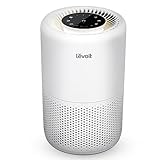








HEPA air purifiers draw in air through a filter that traps airborne particles. The filtered air is circulated back into the room, providing cleaner and fresher air. HEPA filters can trap up to 99.97% of airborne particles, making them a highly effective way to improve indoor air quality.
HEPA air purifiers are commonly used to reduce allergens and improve air quality in homes, especially for people with allergies or asthma.
However, it’s important to note that HEPA air purifiers are ineffective at removing gases, odors, or volatile organic compounds (VOCs) from the air. Other air purifiers or air cleaning technologies may be more effective in those cases.
REGULAR GROOMING
Regular grooming can help remove loose fur and dander from your cat’s coat before it can spread throughout the house. Brush your cat regularly, and consider using a damp cloth to wipe down its coat.
WASH BEDDING AND SOFT FURNISHINGS
Wash any bedding or soft furnishings your cat comes into contact with regularly to remove allergens.
MEDICATION WHEN NECESSARY
If allergies are still an issue, speak to your doctor about taking medication to manage your symptoms.
Remember that no solution is foolproof, and some people with severe cat allergies may be unable to live with cats regardless of how much effort is put into reducing allergens. Therefore, always consider your health and well-being before adopting a cat.
CAN NUTRITION HELP A CAT TO REDUCE TRIGGERING ALLERGIES IN HUMANS?
While proper nutrition is essential for a cat’s overall health and well-being, no specific diet has been proven to reduce the allergenicity of a cat’s dander or saliva.
However, feeding your cat a high-quality, well-balanced diet can help support a healthy immune system and reduce the risk of skin and coat issues, contributing to excessive shedding and dander.
Some veterinarians may recommend a hypoallergenic diet for cats experiencing skin or digestive issues, as these diets are formulated to minimize the risk of triggering allergic reactions.
However, it is essential to note that hypoallergenic diets are not designed to reduce the allergenicity of a cat’s dander or saliva. Therefore, they may not be necessary if your cat has no specific health issues.
While proper nutrition is essential for a cat’s health, it is unlikely to significantly reduce the allergenicity of a cat’s dander or saliva. The other measures mentioned, such as regular grooming and keeping the cat out of certain areas, are more effective in reducing allergen exposure.
ARE NORWEGIAN FOREST CATS RARE?
Norwegian Forest Cats are not considered rare in the United States and many other countries. They are popular and can often be found at reputable breeders, shelters, and rescue organizations.
However, their popularity can vary depending on the location, so availability may depend on where you are looking.
ARE NORWEGIAN FOREST CATS FRIENDLY?
![ARE NORWEGIAN FOREST CATS HYPOALLERGENIC? [ ALL YOU NEED TO KNOW]](https://dorkycats.com/wp-content/uploads/2023/03/dorkycats.com-45-1024x576.png)
Norwegian Forest Cats are known to be friendly and sociable cats. They are generally gentle and affectionate with their owners and often enjoy spending time with their families.
They have a playful and curious nature and are known for their love of climbing and exploring. They are also generally good with children and other pets, although, as with any cat, it is important to supervise interactions to ensure that everyone is safe and comfortable.
ARE NORWEGIAN FOREST CATS WILD?
Norwegian Forest Cats are not wild. Instead, they are a domesticated breed of cat that has been bred for hundreds of years in Norway.
While they have a wild appearance with their thick, long fur and muscular build, they are domesticated cats bred for companionship and make excellent house pets. Norwegian Forest Cats are playful and friendly and are generally known for their affectionate and gentle personalities.
While they may enjoy outdoor activities like climbing and exploring, they should always be kept indoors or in a secure outdoor enclosure for their safety. Norwegian Forest Cats are a domesticated breed that makes excellent pets for those looking for an active and loving feline companion.
WHAT IS THE MOST HYPOALLERGENIC CAT?
While there is no completely hypoallergenic cat, certain breeds are known to produce fewer allergens than others.
Some of the most hypoallergenic cat breeds include:
- Siberian: This breed produces less Fel d 1 protein, the primary allergen affecting cat-allergic individuals.
- Balinese: Similar to the Siamese breed, the Balinese has a longer coat that produces less dander, making it a good option for those with allergies.
- Sphynx: While not entirely hairless, the Sphynx has a very short, fine coat that produces less dander and may be less likely to trigger allergies.
- Devon Rex: This breed has a curly, soft coat that produces less dander and may be less likely to cause allergies.
- Cornish Rex: Similar to the Devon Rex, the Cornish Rex has a curly coat that produces less dander and may be less likely to cause allergies.
It is important to note that while these breeds may produce fewer allergens, individual cats may vary in their allergenicity depending on age, health, and diet.
It is also important to note that allergens are not limited to just fur or dander and can also be found in a cat’s saliva and urine.
If you are considering adopting a cat and have allergies, it is important to spend time with the cat beforehand to see how you react and to speak with your doctor about strategies for managing your symptoms.
IS THERE A 100% HYPOALLERGENIC CAT?
No, there is no 100% hypoallergenic cat. All cats produce some allergens, including a protein called Fel d 1, in their skin, saliva, and urine, which can trigger allergic reactions in some people.
However, some cat breeds are known to produce lower levels of allergens than others, and some people with allergies may tolerate these breeds better than others.
CAN I CAT A HYPOALLERGENIC CAT IF I AM ALLERGIC?
If you are allergic to cats, it is essential to be cautious when considering getting a cat, even if it is a hypoallergenic breed.
While some people with cat allergies may be able to tolerate certain hypoallergenic breeds, there is no guarantee that a particular cat will not trigger an allergic reaction.
Before getting a cat, it is recommended to spend some time with cats of the hypoallergenic breed you are considering to see if you have any allergic reactions.
You can also consider visiting an allergist or immunologist for allergy testing and treatment options.
If you decide to get a cat, you can reduce the allergen exposure, such as regular grooming to remove loose fur and dander, using air purifiers and HEPA filters, and keeping the cat out of certain rooms in the house.
It is important to note that while these steps can help reduce allergen exposure, they may not eliminate it. Discussing strategies for managing your allergies with your doctor is essential.
LEGGI ANCHE: 19+ LAP CAT BREEDS TO LOVE! [AND CUDDLE WITH]

